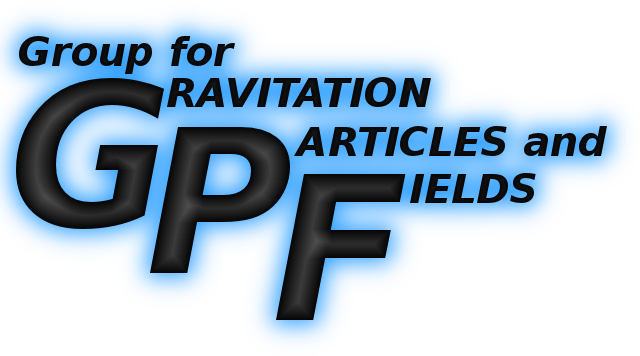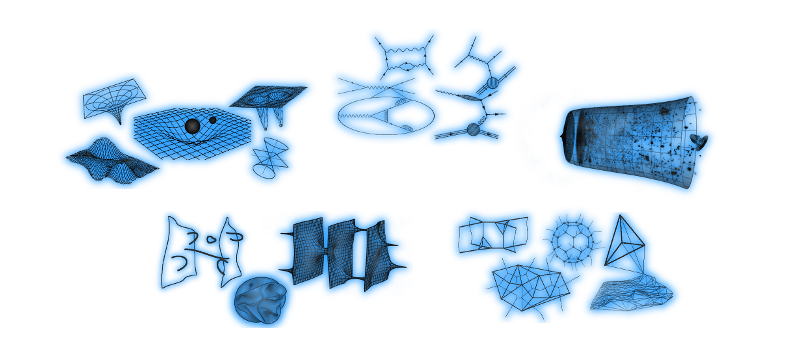


Seminars for the year:
2025
2024
2023
2022
2021
2020
2019
2018
2017
2016
2015
2014
2013
2012
2011
2010
2009
2008
2007
Follow our seminars online via: GPF BigBlueButton server
Time: 25. December 2019, 11:00h
Place: Faculty of Physics, room 665
Speaker: Marko Simonovic
Title: Dynamics of large scale cosmological fluctuations
Abstract:
Understanding of the origin and evolution of cosmological fluctuations is tightly connected to all central questions in modern cosmology. In the linear regime small fluctuations can be described analytically, which leads to the precise predictions for the statistics of the temperature and polarization fluctuations in the microwave background radiation. On the other hand, the fluctuations in the density of galaxies in the late universe are always nonlinear. In this lecture we will demonstrate why the understanding of these fluctuations is key for the further development of cosmology, and we will give a review of the recent results based on the effective field theory methods.
Time: 20. December 2019, 11:00h
Place: Institute of Physics, room 360 (ex-room 300)
Speaker: Marko Vojinovic
Title: The notion of modified gravity and its use in cosmology
Abstract:
We will analyze the notion of modified gravity, i.e. the ways in which GR can be changed, foremost in the IR regime relevant to cosmology. We will introduce several different definitions of the notion "modification of gravity", and discuss their differences. As it will turn out, the crucial role in different definitions plays the number of degrees of freedom in the theory. In the end, we will give a short overview of the Standard Model of cosmology (the so-called Lambda-CDM model, which was awarded this year with one half of a Nobel prize), in the context of the idea of modified gravity.
Time: 6. December 2019, 11:00h
Place: Institute of Physics, room 360 (ex-room 300)
Speaker: Marko Vojinovic
Title: Formation of black holes in scattering processes
Abstract:
One can often hear an argument that the physics at very high energies (for example near the Planck scale) cannot be directly studied via the scattering of elementary particles, since black holes could form, whose event horizons would render the detection of outgoing particles impossible. Moreover, the higher the energy of the scattering process, the bigger the black hole that forms, and thus Nature "resists" our inspection of ever smaller distances, i.e. higher energies. However, when one looks at the details, it turns out that this type of argument is not completely sound. We will present an elementary analysis under which conditions black holes do form in scattering processes, and under which they do not, and we will discuss the level of (in)validity of the statement that black holes interfere with studying Planck scale physics.
Time: 29. November 2019, 11:00h
Place: Institute of Physics, room 360 (ex-room 300)
Speaker: Jan Novak
Title: Ring paradigm as a new approach to quantum gravity
Abstract:
One of the quickly developing mathematical disciplines is algebraic geometry. We will study plabic (planar bicolored) graphs. We define LE-diagrams and decorated permutations and we mention that these three notions are interconnected. We further introduce winding index and formal boundary measurements. The Amplituhedron $A_{n,k,m}$ is the image in the Grassmannian $Gr_{k(k+m)}$ of the totally nonnegative part of $Gr_{k,n}$ under a linear map. It was introduced in 2013 in order to give a geometric basis for the computation in physics.
We show a completely different possible usage of plabic graphs in quantum gravity, which is a work in progress. We will start with philosophical background. We explain the basic idea in physics and then we state the basic directions in future research.
Time: 15. November 2019, 11:00h
Place: Institute of Physics, room 360 (ex-room 300)
Speaker: Salvatore Capozziello
Title: Cosmographic reconstruction to discriminate between modified gravity and dark energy
Abstract:
Cosmography is a model independent approach, useful to discriminate among concurring cosmological scenarios. After reviewing the main features and shortcomings of LCDM model, we propose a cosmographic approach, based on some polynomial series like Pade', Chebyschev, etc. to investigate dark energy and modified gravity. The main result is that series convergence seems a powerful tool to extend the matching with the Hubble flow up to high redshift and then improve the role of observers in Cosmology.
Time: 25. September 2019, 11:00h
Place: Institute of Physics, room 360 (ex-room 300)
Speaker: Diego Cirilo-Lombardo
Title: Dynamical breaking of symmetries beyond the standard model and supergeometry
Abstract:
Group theoretical realizations containing the electroweak sector of the Standard Model are discussed from the supersymmetry point of view. Dynamical breaking of the symmetry is performed and the corresponding quadratic (super Yang-Mills) Lagrangian is obtained. Supercoherent states of the Klauder-Perelomov type are defined to enlarge the symmetry taking into account the geometry of the coset based in the simplest supergroup SU(2|1) as the structural basis of the electroweak sector of the SM. The extended model is superintegrable and the superconnection in the odd part takes a dynamical character. The physical and geometrical implications of the additional degrees of freedom interpreted as a hidden sector of the representation are briefly discussed.
Time: 19. July 2019, 11:00h
Place: Institute of Physics, room 360 (ex-room 300)
Speaker: Tijana Radenkovic
Title: Construction of one-particle states in a curved spacetime in the case of Klein-Gordon field
Abstract:
We will see how quantum field theory of a free Klein-Gordon field in Minkowski spacetime can be formulated without using a plane wave expansion, the reformulation that is of crucial importance for the construction of QFT in curved spacetime. It is necessary that the causal behavior of the curved spacetime be sufficiently well behaved that the space of solutions to the classical field equations have the same basic structure as in Minkowski spacetime, what ensures the condition of global hyperbolicity. The construction of quantum field theory in curved, globally hyperbolic spacetimes will be presented [1]. It will also be demonstrated how in the case of a Klein-Gordon scalar field propagating in an arbitrary, nonglobally hyperbolic static spacetime, a physically sensible, fully deterministic dynamical evolution prescription can be given, as described in Wald's paper [2].
[1] Robert M. Wald "Quatum Field Theory in Curved Spacetime and Black Hole Thermodynamics", University of Chicago Press, 1. edition (1994).
[2] Robert M. Wald "Dynamics in nonglobally hyperbolic static space-times", J. Math. Phys. 21, 12 (1980).
Time: 5. July 2019, 11:00h
Place: Institute of Physics, room 360 (ex-room 300)
Speaker: Maja Buric
Title: Discreteness of time in fuzzy de Sitter space
Abstract:
We analyze the properties of the noncommutative cosmological model defined over the space of the de Sitter group UIR. Although the operator associated to cosmological time is formally symmetric, it turns out that it is not self-adjoint. Restriction to the space of physical states gives a discrete time spectrum and a lower bound on the radius of the Universe, so that the model does not contain a cosmological singularity.
Time: 7. June 2019, 11:00h
Place: Institute of Physics, room 360 (ex-room 300)
Speaker: Tatjana Vukasinac
Title: Non-Abelian gauge theories and diffeomorphisms: canonical approach
Abstract:
We construct a canonical representation of symmetry generators and the corresponding canonical action of non-Abelian gauge theories invariant under diffeomorphisms. We focus on three-dimensional examples, starting with a theory with maximal number of degrees of freedom and finishing with a theory with zero degrees of freedom (Chern-Simons).
Time: 31. May 2019, 11:00h
Place: Institute of Physics, room 360 (ex-room 300)
Speaker: Vitaly Vanchurin
Title: A quantum-classical duality and emergent spacetime
Abstract:
We consider the quantum partition function for a system of quantum spinors and then derive an equivalent (or dual) classical partition function for some scalar degrees of freedom. The coupling between scalars is non-trivial (e.g. a model on 2-sphere configuration space), but the locality structure of the dual system is preserved, in contrast to the imaginary time formalism. We also show that the measure of integration in the classical partition function can be formally expressed through relativistic Green's functions which suggests a possible mechanism for the emergence of a classical spacetime from anti-commutativity of quantum operators.
Time: 23. May 2019, 14:00h
Place: Institute of Physics, room 360 (ex-room 300)
Speaker: Marko Vojinovic
Title: Selected QG topics (3): dynamics in the general field theory framework
Abstract:
The third lecture on general field theory is devoted to the notion of dynamics. We will discuss both local and global properties of dynamics in physics, as well as differences between classical and quantum dynamics. Special attention will be devoted to the case of mechanics, and we will introduce the notion of the effective action in field theory.
Time: 22. February 2019, 11:00h
Place: Institute of Physics, room 360 (ex-room 300)
Speaker: Raju Roychowdhury
Title: Poisson Lie symmetry and Yang-Baxter sigma model
Abstract:
In this talk we will explain how Poisson-Lie T-duality helped us to solve an old problem in the theory of integrable models. We will see how one can deform a sigma model to give rise to what is known as epsilon-deformed principal chiral model or Yang-Baxter sigma model. The deformed model is Poisson-Lie symmetric and still integrable with respect to the same Lax pair as that of the original model and have the same system of equations describing their dynamics. This is due to the fact that the deformed target of the string and the non-deformed target of the string can be expressed by the same first order dynamics.
Time: 20. February 2019, 11:00h
Place: Institute of Physics, room 360 (ex-room 300)
Speaker: Raju Roychowdhury
Title: Emergent gravity and brane correspondence between topological T-duals via generalised complex geometry
Abstract:
During past few years, I started developing the formalism of emergent gravity which naturally admits an in-built generalized geometric structure and hence in quite similar to the DFT formalism of Hull and Zwiebach in spirit. We are trying to use the generalized geometric point of view to study topological T-duality that arises in emergent gravity. The approach aims to build a Courant isomorphism between T-duals and thus transport generalized complex structures between them. We are trying to use the machinery developed by Gualtieri and Cavalcanti to transport generalized complex brane between T-duals. We want to study various explicit example of this phenomenon of geometric T-duality and explore its manifestation in Stringy geometry.
Time: 18. February 2019, 12:00h
Place: Institute of Physics, library room "Dragan Popović"
Speaker: Raju Roychowdhury
Title: Emergent spacetime, topology change and resolution of singularity
Abstract:
The contemporary physics has revealed growing evidences that the emergence can be applied to not only biology and condensed matter systems but also to gravity and spacetime. We observe that noncommutativity necessarily implies emergent spacetime. In Emergent Gravity approach the spacetime geometry is defined by U(1) gauge fields on noncommutative (NC) spacetime. Accordingly the topology of spacetime is determined by the topology of NC U(1) gauge fields. We show that topology change of spacetime is ample in emergent gravity and the subsequent resolution of singularity is possible in NC spacetime. Thus emergent gravity provides a well-defined mechanism for topology change of spacetime which does not suffer from any singularity in sharp contrast to general relativity.
Seminars for the year:
2025
2024
2023
2022
2021
2020
2019
2018
2017
2016
2015
2014
2013
2012
2011
2010
2009
2008
2007
Follow our seminars online via: GPF BigBlueButton server